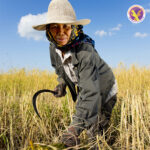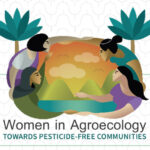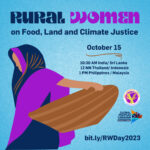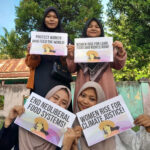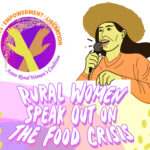Oral Statement to be Delivered to the General Discussion The 56th Session of the United Nations Commission on the Status of Women
Thank you for this opportunity to participate in the General Discussion and address the 56th session of the Commission on the Status of Women. We, nine rural and indigenous women from Southeast and East Asia are here for the first time to voice out our concerns and recommendations to the CSW.
This statement is on behalf of Asia Pacific Forum on Women, Law and Development (APWLD) and the Asian Rural Women’s Coalition (ARWC), two leading women’s networks representing rural women, including indigenous women, peasants, agricultural workers, Dalit women, fisherfolks, pastoralists, workers and migrants from more than 25 countries in Asia Pacific region. Asia Pacific has over 65% of population living in rural and remote areas.
This world is an unjust place for the majority of rural and indigenous women living in the global south. With the least economic resources of all populations we face systemic violations of our rights in a world where economic power increasingly equates to political and personal power. We urge that the Commission’s discussion translates into concrete measures that realise the enjoyment of rural women’s rights across the world.
While there have been repeated international commitments to realise rural women’s rights, our experiences as rural and indigenous women demonstrate that there still are many obstacles restricting the enjoyment of our rights. We identified right to a dignified livelihood and access to resources, violence against women, women’s access to education, health care, and discriminatory laws and practices as key priority issues. These reflect key issues that the CEDAW Committee has raised in the context of Article 14, the only international treaty obligation that addresses the specific needs of rural women.
Violence against women persists in all countries and is a major obstacle to rural women’s empowerment and the enjoyment of their rights. Rural women experience violence from the state, from family members, in the workplace, from community members, in most cases aggravated by our multiple identities. Our communities are less likely to have state services to provide support to survivors of violence, less likely to have access to justice through courts and police and less likely to be able to leave violent relationships or pay legal expenses with little financial resources. State practices expose us to further violence: There are reported cases of ethnic minority women who go through sexual violence including forced sexual services in the course of obtaining an identity card for example.
Education and training for women is key to empowering women in rural and remote areas. Yet, communities and villages away from the big cities do not always have schools or teachers present to teach or resources for schools. Experiences tell us that cut backs in public education expenditure and the privatisation of education translates into the withdrawal of more girls from schools. Subsequently, lack of education and training limits women’s access to decent employment opportunities and meaningful participation in political and public life.
The right of women to control all aspects of their health is fundamental to their life and integrity. Rural women face significant barriers to health care, especially when it comes to sexual and reproductive health. Fertility rates and maternal mortality in rural areas are generally higher than those in urban areas as we have less access to sexual education, family planning and health care services. Neoliberal economic policies have resulted in reduced government spending, privatisation of health and increased user fees for essential public services. Since our health is not sufficiently profitable so we become the last priority for healthcare. It is also reported that due to inadequate budget allocation, there is not enough stock of core essential medicine in rural areas.
Access, ownership and inheritance of land is important for rural women’s economic empowerment. However, many of our lands are being sold to private investors, large corporations and developers. These practices are encouraged in the name of economic development and growth. Yet they reinforce the divide between those who are enriched by corporate profits and those of us whose loss of livelihoods enables that profit. Furthermore, gender-based stereotypes and discrimination deny our access to and control over land. We are seen as dependent wives, mothers and daughters – and when we get married or divorced, we lose our land titles.
The under-representation of women from rural areas in political and public life remains high in most societies. Discriminatory attitudes and practices limit the space for women’s political participation within their communities. Our voice and genuine, active participation is essential in any policy making – locally, nationally, regionally and internationally. Due to limited to non-existent access to information and education opportunities, women are often unaware of the rights they have under the law, or are not empowered to claim these rights effectively.
We, as rural and indigenous women from Asia Pacific, call upon the States to:
– Recognise that the full enjoyment of human rights and fundamental freedoms is an essential principle for development and poverty eradication, not the other way around. Material wealth and economic growth does not automatically result in the enjoyment of human rights and can in fact exacerbate the divide between us and the wealthy;
– Recognise that access to arable land and productive resources is essential to the eradication of poverty, hunger, malnutrition and dignified, sustainable livelihoods for rural women;
– Ensure that legal and policy reforms guarantee women’s full enjoyment of rights;
– Allocate the financial, technical and human resources necessary for rural women’s access to education and training, information, healthcare and nutrition services and infrastructure;
– Ensure that all rural and indigenous women have access to personal identification documents, free-of-charge, so that they can fully exercise their rights as a citizen;
– Establish data that is disaggregated by sex and others such as rural and urban populations
– Ensure equal representation and meaningful participation of rural and indigenous women in the decision-making processes at all levels;
– Ensure presence of and financial support for rural women’s rights organisations, including for awareness-raising on rural women’s rights.
5 March 2012



